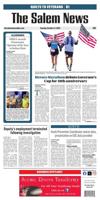The University of Missouri Extension continues to make a meaningful impact across Mid-Missouri through its agronomy and pasture management programs. Rudra Baral, Agronomy Specialist, has been working with producers and community members to provide hands-on education, testing, and field support in the region.
During September 2025, Baral led pasture walks in Eldon, St. Thomas, and Dixon, helping local farmers identify and manage pasture weeds. The Extension office also offered free nitrate testing for producers in Cole, Osage, Miller, and Pulaski counties, supporting forage safety and livestock health.
Extension staff hosted outreach booths at the Taste of Osage event in Linn and the Cow Day celebration in Dixon, where they connected with over 50 community members to share agricultural resources and answer field-related questions.
Additionally, Baral reviewed soil sample reports from multiple counties, providing producers with personalized recommendations to improve soil health and crop productivity. Support was delivered through in-person visits, phone consultations, and email follow-ups.
• Conducted pasture walks in three producers’ fields to improve pasture weed management.
• Provided free nitrate testing to six producers, helping ensure forage safety.
• Reached over 50 individuals through outreach events.
• Delivered tailored soil management advice to producers in seven Missouri counties and one in Texas.
• Offered technical assistance to 13 producers on topics such as pasture management, soil health, and forage quality.
Farmers and community members are encouraged to take part in upcoming MU Extension programs, including:
• Pasture Walks: October–November (by appointment)
• Free Nitrate Testing Program: Ongoing through November
• Forage Quality Management Workshops: Oct. 24, Jefferson City; Oct. 27, Tuscumbia; Oct. 29, Owensville; and Nov. 5, Linn.
Producers are reminded that free nitrate testing is available in all coverage counties. Nitrate accumulation in forages can occur under stressful growing conditions such as drought or heavy nitrogen application, posing risks for livestock feeding. Crops most at risk include sorghum, sudangrass, sorghum-sudangrass hybrids, corn, millet, and johnsongrass.
Producers interested in testing should contact Rudra Baral at the MU Extension office to schedule an appointment. Baral will provide testing materials and coordinate sample collection.















